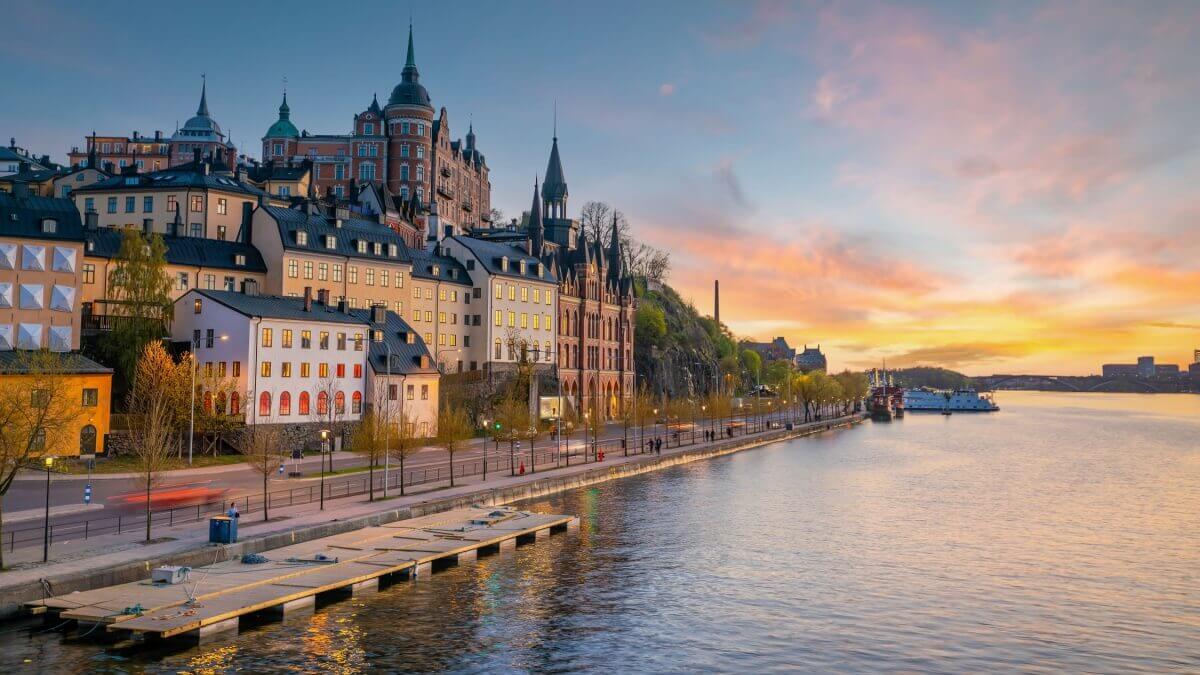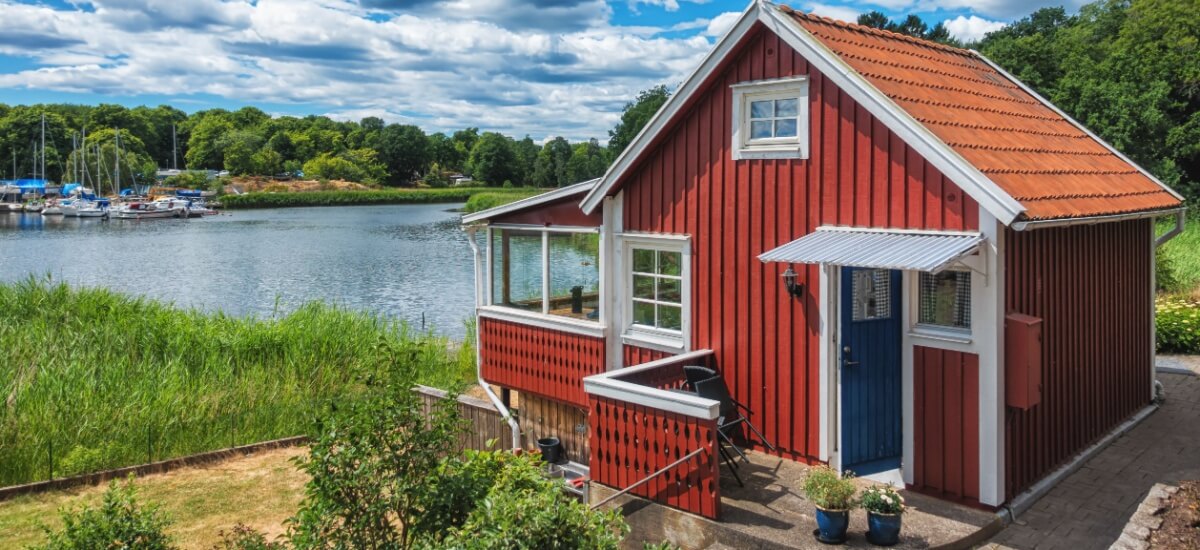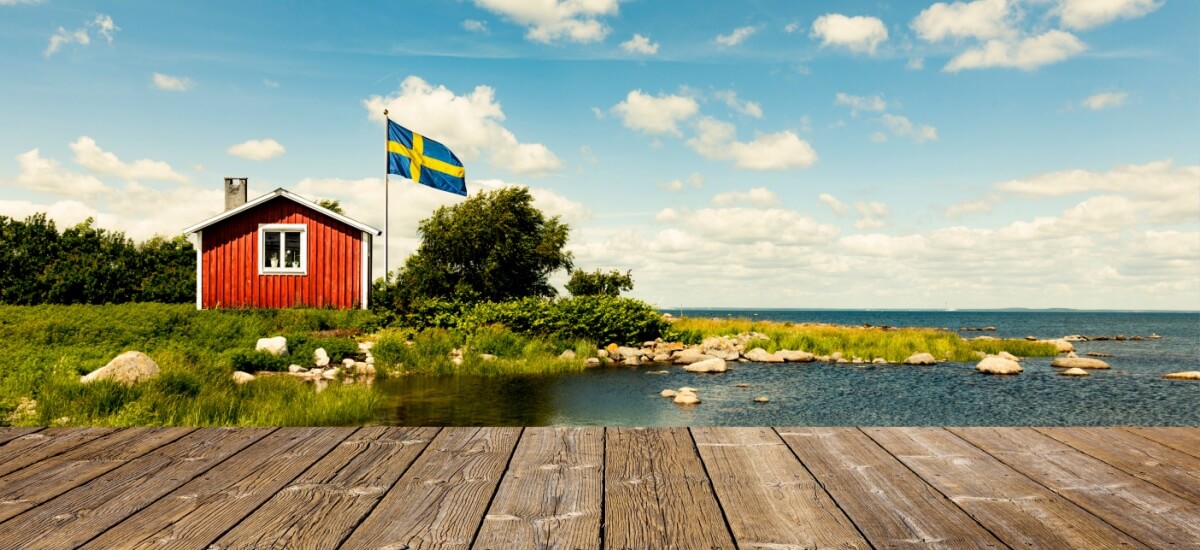Moving to Sweden from the UK: a complete guide
Everything you need to know about moving to Sweden from the UK. Read about visas, popular expat destinations, healthcare and more.

Planning to relocate to Sweden from the UK? Perhaps you’re starting a business in Stockholm, working in Gothenburg or retiring in Malmö. You might even be looking for a holiday home or investment property in the country.
Whichever is the case, read on. We’ve put together a complete guide to buying property in Sweden as a foreigner. This includes what to expect from the buying process, the latest info on Swedish property prices and tips on how to start your property hunt.
If you’re looking for ways to save money on currency exchange when buying property in Sweden, check out the money services provider Wise. You can send large transfers with Wise for low fees* and great exchange rates - making it ideal if you’re sending a secure international transfer.
Before you start your house hunt, it can be useful to know a little about how the process of buying property works in Sweden.
Here’s a quick overview of the steps involved:¹
We’ll run through some tips on how to search for property later in this guide, including online property portals and local estate agents.
Make sure you have your finances in order and know exactly what you’re looking for before you arrange viewings. In many cases, you’ll need to have your mortgage arranged before you can attend viewings.
In Sweden, most viewings will be in an ‘open house’ format, rather than personal viewings. Arranged by the real estate agent, open house viewings are where all interested people are invited to come to the property to look around and ask questions - without needing a fixed appointment time.
At open house viewings in Sweden, it’s common for interested parties to place bids on the spot, or submit them to the estate agent shortly after. You may find out if your bid has been successful by SMS.
While this bidding process can be intensely competitive, it’s worth bearing in mind that bids are not legally binding. So, you can withdraw if you find a better property or change your mind.
If your bid has been successful, the process of closing the deal can happen very quickly - sometimes within as little as 14 days.
The purchase agreement will be signed by both parties, and you’ll pay the deposit. This is usually around 15% of the sale price.
This is your chance to bring in a professional surveyor to check over the property, making sure that its structurally sound and flagging up any potential problems.
If you’re happy with the results of the survey, you’ll transfer the remaining balance to the seller. The seller will issue a bill of sale - this is known as a kapebrev. The details of the sale will then be submitted to the Land Registration Authority.
And apart from settling stamp duty and other fees/taxes (which we’ll look at shortly) this is the purchase complete. You’ll get the keys to your new home, and can settle into your new life in Sweden.
| 💡 Read more: How to transfer large amounts of money from the UK? |
|---|
Swedish banks do offer mortgage loans to foreigners, but the terms, rates and eligibility requirements may be different than those for local buyers. Some banks may even give you a mortgage if you’re not living in the country - Swedbank, SEB and Handelsbanken are some options to try.²
There’s also the matter of what documents you need to apply for a mortgage, a Swedish ID card and residency permit often being key requirements. It varies between banks, but you’ll usually need to provide the following:¹
It’s also important to note that in Sweden, you usually can’t borrow more than 85% of the property value.¹
Alongside the purchase price for your chosen property, you also need to factor in the relevant fees and taxes for buying property in Sweden. This is important, as it can affect your overall budget.
Here are the essential costs you need to know about:²
While you may need the services of a lawyer, many property sales in Sweden take place without the need of a conveyancer. The real estate agent handles the whole process,¹ and the seller pays their fee.² If you end up selling a property in Sweden, this will be your responsibility - and the fee is usually between 3% and 5%.²

The Swedish property market experienced a downturn in 2022, with property prices plummeting. Signs of recovery emerged in early 2023, although there have been dips since then.
Experts are now saying that the housing market has turned a corner, with prices rising sharply in April 2024 and expected to continue increasing by 5-10% until the end of 2025.
While buyers may prefer property prices to stay low, the good news is that there’s a record-high supply of both houses and apartments across the country.³ This means you should have a better chance of both finding and securing your dream home.
Yes, foreign expats can buy property in Sweden. There are no rules stipulating that you have to be a Swedish citizen or even have a Swedish ID number to buy a house or apartment in the country. However, you might potentially need Swedish residency documents in order to apply for a mortgage from a Swedish bank.
The most important thing you’ll need is a personal identification number (personnummer) from the Swedish Tax Agency. This is required for all legal transactions in the country, including property purchases.⁴
You’ll also need to open a Swedish bank account.⁴
No, unfortunately you can’t automatically get or apply for permanent residency in Sweden just by investing in property. Unlike some other countries, Sweden doesn’t have a ‘Golden Visa’ scheme which enables this.¹
Now we come to the important question - how much is property in Sweden?
Considering that the cost of living in Sweden is generally higher than in the UK, you might be surprised to learn that property prices tend to be lower on average.
Although it depends which town or city you choose, apartments in city centres tend to be around 18.7% cheaper per square metre in Sweden than in the UK. If you buy outside a city centre, you’ll benefit from prices that are around 33.8% lower per square metre.⁵
And here’s a guide to what you can expect to pay per square metre in some of Sweden’s major cities:⁶
| City | Average apartment price per sq.m - city centre | Average apartment price per sq.m - outside city |
|---|---|---|
| Stockholm | 103,322 SEK | 54,010 SEK |
| Gothenburg | 57,646 SEK | 36,668 SEK |
| Malmö | 37,555 SEK | 22,375 SEK |
Remember though that property prices will also vary depending on the type of property.
Another thing to note when figuring out the price for property in Sweden is that international transfers could get expensive, especially if the provider adds a margin to the exchange rate to convert your pounds. Consider checking out Wise to handle your large transfers with mid-market exchange rates and low, transparent fees*.
In terms of the major cities in Sweden, Malmö is the cheapest. But prices there are still on the high side.
If your budget won’t stretch that far, it might be worth looking into places like Uppsala, Linköping, Örebro and the coastal town of Gävle - where property prices may be lower.
Planning to buy a holiday home or summer house in Sweden? You might want to start your search in Västra Götalands county (in southwestern Sweden), where property prices are lower than other areas.
There are a few ways you can find property to buy in Sweden - namely, real estate agencies and online property portals.
You don’t have to use a real estate agent to find a property to buy, but it can be helpful - especially if you’re moving to Sweden from the UK and are unfamiliar with the local property market.
If you’re looking for a buyer’s agent, you can choose a UK agency that specialises in international property (with expertise in Sweden). Or you can find a local Swedish agent.
You can also search for property in Sweden online, from the comfort of your current home in the UK. All you need is an internet connection.
Here are some of the most popular property websites for Swedish real estate:

Sweden is generally considered a safe place for property transactions, and its property market is well-regulated.
But there are still some potential pitfalls and risks you should look out for, including the following:⁷
And of course, you should take all possible measures to protect yourself from scams and fraudsters.
The right property for you will all depend on where you want to live, the type of home and of course, the price in relation to your budget.
If you’re not already living there, it’s worth making a trip to check out the local area and view properties. Pay attention to local transport links and amenities, and try to get a feel for the area.
It’s crucial to do as much research as possible before committing to purchase a property. You might not have much time, as the Swedish property sale process can be quite quick, but make sure you arrange a professional inspection to check the condition of the property and to flag up any major issues.
As you look forward to getting the keys to your new home, you’ll have a final few tasks to check off your list. These include taking out insurance, setting up your utilities and carrying out any energy efficiency renovations.
While it’s not mandatory in Sweden, it’s always a good idea to have property insurance. Ideally, it should be in place starting from the day of completion.
If you know when your completion date will be, it makes sense to get some essentials set up in advance of moving in. A prime example is utilities, such as heating, power and water. Get these sorted as early as you can, and the moving process should be a little smoother.
While Sweden may be known for the energy efficiency and sustainability of its properties, not all are at the required standard - especially older homes.
If this is the case for the house you’ve purchased, you might want to make it a priority to carry out improvements to heating systems and insulation. You might even want to do this before you move in. This is especially important for properties located in colder parts of the country, or if you’re buying in winter.
And that’s it - our complete guide to buying property in Sweden for foreigners. We’ve covered everything you need to know, from the buying process to fees, taxes and property prices.
After reading this, you should have a better grip on how it all works, and be ready to start house hunting. Just make sure you have all your documents ready and your finances in order.
And, if you want to save money while buying your new property in Sweden, use the Wise account to send your international transfer. It’s not a bank account but offers many similar features.
Here are the main benefits for using Wise: |
|---|
|
Sources used:
Sources last checked on date: 05-Aug-2024
*Please see terms of use and product availability for your region or visit Wise fees and pricing for the most up to date pricing and fee information.
This publication is provided for general information purposes and does not constitute legal, tax or other professional advice from Wise Payments Limited or its subsidiaries and its affiliates, and it is not intended as a substitute for obtaining advice from a financial advisor or any other professional.
We make no representations, warranties or guarantees, whether expressed or implied, that the content in the publication is accurate, complete or up to date.

Everything you need to know about moving to Sweden from the UK. Read about visas, popular expat destinations, healthcare and more.

Are you wondering how to buy a Swedish summer house? We’ve got you covered with our detailed guide.

Cost of living in Sweden varies from region to region. This guide outlines what you can expect in terms of living costs.

Coffee lovers rejoice-- one of Sweden’s most loved daily rituals is the fika, or the social coffee break. Beyond a love of caffeine and sweet treats, Swedes...

In this article you'll find useful and important information regarding the healthcare system in Sweden.

Sweden has one of the world’s best universal healthcare systems. Treatment outcomes in Sweden are rated as some of the best in the world. So if you’re...